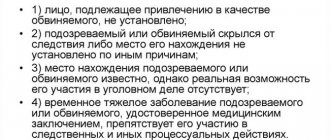Reconciliation of parties in a criminal case
Not everyone knows that the termination of criminal cases in the Russian Federation is possible in connection with the reconciliation of the parties.
This is a very convenient and popular form of terminating criminal prosecution. It suits the court, the prosecutor's office, the preliminary investigation and inquiry bodies, and is regulated by the Criminal Code and the Code of Criminal Procedure of the Russian Federation. In Russia, many cases are initiated as a result of domestic crimes that occurred as a result of quarrels or fights. For this reason, often both parties, the victim and the accused, come to a decision to drop the criminal case.
The injured party wants to withdraw the statement due to constant interrogations, confrontations, court hearings and other “pleasures” of the criminal process. However, a statement written and submitted in cases of private-public prosecution can no longer be withdrawn, no matter how much the victim (applicant) wants it.
It is in such cases that the opportunity to stop pursuing reconciliation of the parties comes to the rescue. Criminal law provides such an opportunity there.
The Criminal Procedure Code (Article 25) provides that the court and representatives of the investigative and inquiry authorities have the right to terminate the proceedings of a criminal case. This is possible on the basis of a statement provided by the victim or his representative. A suspect (accused) of committing a criminal act of minor/medium severity for the first time may be released from criminal liability, subject to compensation to the victim for damage caused by illegal actions and reconciliation with him. This is provided for by the Criminal Code of the Russian Federation (Article 76).
To do this, it is mandatory to comply with the following conditions:
- the criminal act is of low or medium severity;
- the perpetrator committed illegal actions for the first time, had no previous convictions (a previously expunged or expunged criminal record is allowed);
- reconciliation of the perpetrator with the victim (subject to the obligatory consent of the victim to reconciliation);
- the perpetrator compensated for the damage caused to the victim.
In this case, the important task of the lawyer is to convince the victim of reconciliation, since the accused/suspect cannot always do this.
When is it possible to make peace?
If the crime is not associated with too severe consequences for the victim, there is a chance to resolve the matter peacefully. We are talking about fraud for a small amount, petty theft, causing minor harm to health.
The current Criminal Code of the Russian Federation provides for the conditions under which the reconciliation procedure is possible:
- The damage is considered to be of minor severity. The criterion is the duration of the imposed punishment. It cannot exceed 6 years of imprisonment; if the code provides for more, reconciliation will not be achieved.
- A person commits an illegal act for the first time.
- The criminal compensated for the damage to the victim and sincerely repented of his crime.
- The victim writes a statement of readiness to stop criminal prosecution.
Reconciliation of the parties at the investigation/inquiry stage
Despite the fact that the law allows a case to be terminated at the preliminary investigation stage, this almost never happens (according to the practice of the Moscow region). The investigator or inquiry officer in any case sends the case to court.
The reasons for such actions are not fully understood; they probably lie in internal instructions or orders of departments, based on the need to show a certain kind of statistics of cases sent to court.
Reconciliation of the parties in court
As a rule, problems do not arise in court. The court reconciles without objection, the prosecutor's office supports (a striking example is my case under 112 of the Criminal Code of the Russian Federation). This happens in one court session. The procedure is standard; a corresponding statement from the victim is required, but still a lot depends on the judge.
Someone also demands a similar statement of reconciliation from the defendant. There is no template fixed by law; it is written in free form, the main thing is that the expression of will is clear. Also, the physical presence of the victim in court is required.
Sometimes clients turn to me regarding public accusations with the intention of obtaining a decision to terminate the criminal case for reconciliation of the parties. And I explain to them that in such situations this rule does not apply. It is impossible to reconcile, for example, for drug possession, even if the accused is charged for the first time. There is no victim as such in such cases; such a form of termination of a criminal case is impossible.
Sample application for reconciliation of the parties
The Code of Criminal Procedure and the Criminal Code of the Russian Federation do not establish a strict form of petition for reconciliation of the parties in criminal proceedings. It must take the form of a regular application, which must contain the following information:
- the name of the investigative body, prosecutor's office or court to which the request is sent;
- complete information about the applicant, taking into account his legal status in the case, residential address, telephone number and full name;
- the essence of the request and its grounds specified in Art. 25 of the Code of Criminal Procedure of the Russian Federation and Art. 76 of the Criminal Code of the Russian Federation;
- substantiation of the petition indicating the amount of material damage compensated by the guilty person;
- the applicant’s signature with its transcript and the date of submission.
In order to achieve reconciliation in a criminal case and achieve a positive decision from law enforcement agencies or the court, you should draw up a request and substantiate the parties’ arguments with appropriate arguments. Experienced lawyers of our company will help you correctly draw up such a document and argue for it. With their help, you will have a real chance of a peaceful resolution of the conflict. To do this, just call the numbers listed on our website or contact lawyers online.
Is it necessary to admit guilt?
The law does not contain such a requirement. I have already described a case where the parties reconciled without this. But the prosecutor's office reacts positively to the presence of such a circumstance as an admission of guilt. Once, before a court hearing, a state prosecutor tried to prove to me and impose on me the mandatory nature of such a criterion. From which I concluded that, again, for some reason this is an important circumstance for the prosecutor’s office.
Sometimes even judges insist on this, the logic can be understood: they say, why do you compensate for damage if you do not admit guilt? But the answer lies on the surface: defendants, understanding the statistics of acquittals, weighing temporary labor costs and financial expenses for a lawyer, choose a more convenient way to return to normal life as soon as possible. Because even the thought that a criminal case has been opened against them, the outcome of which is not clear in the near future, puts a lot of pressure on them and makes them nervous.
Section I. General provisions
Article 1. Goals and objectives of judicial reconciliation
1. Judicial reconciliation is carried out in order for the parties to achieve a mutually acceptable result and resolve the conflict, taking into account the interests of the parties.
2. The objectives of judicial reconciliation are to correlate and bring together the positions of the parties in the case, to identify additional opportunities for resolving the dispute, taking into account the interests of the parties, and to assist them in achieving the result of reconciliation.
Article 2. Principles and legal basis of judicial reconciliation
1. Judicial conciliation is carried out on the basis of the provisions of the Code of Civil Procedure of the Russian Federation, the Arbitration Procedure Code of the Russian Federation, the CAS of the Russian Federation, legislation on the status of judges in the Russian Federation, and the provisions of these Regulations.
2. The principles of judicial conciliation are voluntariness, cooperation, equality of the parties, independence and impartiality of the judicial conciliator, confidentiality, and good faith.
Article 3. The principle of voluntariness
1. The parties participate in judicial reconciliation voluntarily. The candidacy of a judicial conciliator is determined by mutual agreement of the parties. The parties have the right to jointly determine the most appropriate procedure and result of reconciliation.
2. The party (parties) have the right to refuse to continue judicial reconciliation at any stage of its implementation by notifying other participants in judicial reconciliation in writing.
Article 4. Principle of cooperation
The parties to judicial conciliation cooperate with each other, with the judicial conciliator and with the court.
Negotiations between the parties are constructive and creative in nature, aimed at resolving the dispute, and take place in an atmosphere of trust and mutual respect.
Article 5. Principle of equality
The parties to judicial conciliation enjoy equal rights to determine the candidacy of a judicial conciliator, participants in negotiations, the rules and procedure for conducting judicial conciliation, individual work with a judicial conciliation, access to the information under discussion, the development and formulation of proposals for resolving the dispute, assessing their acceptability and feasibility, and exercising their rights and legitimate interests.
The judicial conciliator has no right, through his actions, to put any of the parties in a preferential position, nor to diminish the rights of one of the parties.
Article 6. Principle of confidentiality
1. The parties have the right to determine the scope of restrictions on the dissemination of information related to judicial reconciliation.
Unless the parties agree otherwise in writing, information obtained by the participants during judicial conciliation is confidential.
In particular, the parties, the judicial conciliator and other persons present during judicial reconciliation do not have the right, without the written consent of both parties, to refer, when considering the case in court, to the opinions or proposals expressed by one of the parties regarding possible reconciliation; admissions made by one of the parties during the procedure; manifestation of the readiness of one of the parties to accept the proposal for reconciliation made by the other party; information contained in a document prepared solely for judicial conciliation.
2. During judicial reconciliation, the parties have the right to disclose information to the extent deemed necessary for the successful settlement of the dispute.
All information created or received during judicial reconciliation, regardless of the form of the medium, is not subject to disclosure or distribution by participants in judicial reconciliation without the written consent of the parties.
3. Information about judicial reconciliation may be used for research, educational or informational purposes, provided that the anonymity of the parties is maintained.
Article 7. The principle of independence and impartiality of the judicial conciliator
1. The attitude of the judicial conciliator towards each of the parties is impartial, respectful and friendly.
The judicial conciliator ensures equal participation of the parties in judicial reconciliation.
2. The judicial conciliator is obliged to inform the court and the parties about any circumstances that may raise doubts about his independence and impartiality.
3. The judicial conciliator is independent and carries out his activities independently, without the participation of the judge in charge of the case.
Article 8. Requirements for judicial conciliators
1. A judicial conciliator is a retired judge who is included in the list of judicial conciliators, which is approved by the Plenum of the Supreme Court of the Russian Federation.
2. A retired judge who is involved in the administration of justice has no right to act as a judicial conciliator.
3. A retired judge who works in government bodies, local government bodies, state and municipal institutions, in trade unions and other public associations, as well as as an assistant to a deputy of the State Duma or an assistant to a member of the Federation Council of the Federal Assembly of the Russian Federation or an assistant to a deputy legislative (representative) body of a constituent entity of the Russian Federation or appointed to the position of commissioner for the rights of consumers of financial services, does not have the right to act as a judicial conciliator.
Article 9. Formation of a list of judicial conciliators
1. The list of judicial conciliators is formed and approved by the Plenum of the Supreme Court of the Russian Federation on the basis of proposals from the chairmen of the judicial panels of the Supreme Court of the Russian Federation, cassation courts of general jurisdiction, a military court of cassation, district arbitration courts, the Intellectual Rights Court, appellate courts of general jurisdiction, a military court of appeal , arbitration courts of appeal, supreme courts of republics, regional, regional courts, courts of federal cities, courts of an autonomous region, courts of autonomous districts, arbitration courts, district (naval) military courts on the candidacies of judicial conciliators from among retired judges who have expressed a desire to act in as a judicial conciliator, taking into account their characteristics of compliance with the requirements of this Regulation.
Proposals from courts of appeal of general jurisdiction, appellate military courts, arbitration courts of appeal, supreme courts of republics, regional, regional courts, courts of federal cities, courts of an autonomous region, courts of autonomous districts, arbitration courts, district (naval) military courts on candidates for judicial conciliators from The number of retired judges of these courts, as well as district courts, retired justices of the peace is collected by the relevant cassation courts of general jurisdiction, military cassation court, district arbitration courts and, together with the proposals of these courts, they are sent to the Supreme Court of the Russian Federation.
2. When compiling the list, the work experience as a judge, scientific experience, specialization, region of residence of the candidate, activities carried out by the retired judge since his resignation, and compliance of this activity with the legislation on the status of judges and the code of judicial ethics are taken into account.
3. The list of judicial conciliators, as well as these Rules, are posted on the official website of the Supreme Court of the Russian Federation on the Internet information and telecommunications network.
This Regulation and relevant excerpts from the list of judicial conciliators, containing information about those judicial conciliators whose information was provided by the courts, are posted on the official websites of courts and justices of the peace on the Internet.
Is it necessary for the victim to participate in the court hearing?
This can sometimes be difficult. Most judges insist that the victim be present in person and express his will in person. Its absence may be grounds for refusal to reconcile the parties. The practice in Moscow in this regard is disappointing. Even if there is a statement at the investigation stage, but in the absence of the injured party in the trial itself, the courts do not reconcile.
Moreover, it happens that they take a statement from the victim that he has been notified of the date of the court hearing, that he is not against the special procedure, but they do not specify the desire to reconcile. Therefore, it is very important that the lawyer ensures the voluntary appearance of the injured party at the court hearing. Notified me on time, called again and reminded me.
This is not difficult, but sometimes victims do not appear in court due to simple forgetfulness. An attentive lawyer should not allow this to happen.
If it so happens that the court of first instance was held without the victim, ensure his appearance in the court of second instance. The Court of Appeal provides conciliation even in such situations. There is such a practice in Moscow.
Also, a lawyer should always pay attention to the power of attorney of the victim’s representative (for example, if the victim is a legal entity, as was the case here). Judges like it when the authority to seek reconciliation is clearly stated there.
Conditions for terminating a criminal case upon reconciliation between the accused and the victim
The main criterion is maximum compensation and full compensation for the harm caused. However, in practice, this does not mean that the victim actually forgives the offender - what is important is his willingness to waive further criminal proceedings and accept financial compensation.
The most common option is for the accused to pay an amount for moral damage caused and fully provide treatment for the victim in case of harm to health.
Important: this procedure is not possible in relation to repeat offenders, persons who face a sentence of more than 6 years in prison. The victim is required to express his will in writing, otherwise the case is considered in the general manner.
When considering an appeal, the court examines the circumstances that must be clarified. It is taken into account whether the statement was made or by the victim. If he cannot submit the document, the right is transferred to his legal representative (lawyer, close relative). It is being determined whether the appeal was completely voluntary and not signed under the influence of force or threat. It takes into account how the damage was compensated. Before making a decision, the parties are explained the consequences of completing the procedure.









